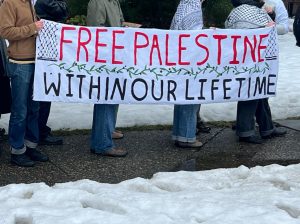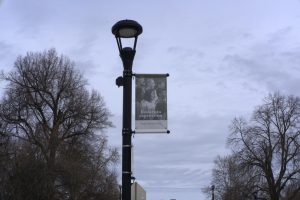Whitman Ties to End of Death Penalty
October 23, 2018
Four Whitman students were arrested while protesting the execution of Jeremy Sagastegui at the Walla Walla penitentiary in October of 1998. Now, 20 years later, Washington becomes the 20th state to end the death penalty.
The basis for Washington Supreme Court’s unanimous decision largely rested on the unfair and racially-biased application of the death penalty. Racial bias is categorized as unequal protection under the law, which violates the 14th Amendment and Washington’s state constitution.
Politics professor Timothy Kaufman-Osborn, a long-time opponent of the death penalty, has researched the failings of the state’s proportionality review, a comparison process all cases on death row must undergo which is supposed to ensure only the “worst of the worst” are executed. Kaufman-Osborn’s research highlighted the proportionality review’s inability to meaningfully distinguish between who receives the death penalty and who receives life imprisonment without parole, the two possible sentences for those convicted of aggravated first degree murder.
“As Justice Stewart said in a 1972 Supreme Court decision invalidating capital punishment throughout the United States, there must be a rational basis for distinguishing between those who are sentenced to death and those who are not,” Kaufman-Osborn said. “At that time, Stewart argued, the death penalty is applied in a random manner, and, to make that point, he suggested that getting sentenced to death is like being struck by lightning.”
University of Washington sociology professor Katherine Beckett found that this process was not purely random, however, and was applied with racial bias.
“What she was able to show was two things…If you’re an African American defendant in the state of Washington and if the prosecutor is seeking the death sentence, you are four and a half times more likely to be sentenced to death if you’re African American as opposed to white,” Kaufman-Osborn said. “The other thing that the State Supreme Court concluded…again on the basis of Beckett’s research, is that…you’ve got a statewide law that is being applied in a geographically arbitrary manner.”
Of the 39 counties in Washington state, only three have sought the death penalty and only two imposed it in the last 20 years.
“As near as anyone can tell [this] is because death penalty cases are extraordinarily expensive…and most counties in the state of Washington, even if they don’t admit it in so many words, have basically concluded that they can’t seek death sentences because they can’t pay the lawyers for all the appeals,” Kaufman-Osborn said.
Kaufman-Osborn’s interest in the death penalty began in 1993 when he protested the hanging of Wesley Allan Dodd. He was there to represent the Washington chapter of American Civil Liberties Union, ACLU, for which he was on the board of directors.
“Many of the folks who were in support of the death penalty had brought with them, not just signs, but also bottles of champagne, fireworks, and [at midnight] all the fireworks went off, the bottles of champagne were uncorked and chants went up. It was a kind of a remarkable spectacle,” Kaufman-Osborn said. “So on the one hand I was horrified by what had happened…and the kind of ugliness of what I had just seen. On the other hand, as a good academic, I was fascinated by what just happened.”
Five years later, Whitman students chose to protest Sagastegui’s execution. Four students remained on the penitentiary ground even after the announcement of Sagastegui’s death when they were asked to disband. Brianne Wojtesta, one of the students arrested, remembers linking arms and sitting down on the grass after most of the protesters had left.
“Executions happen at midnight…and then [the penitentiary security] gives you an hour to essentially mourn,” Wojtesta said. “Something happened with this one…it was sometime significantly after midnight when he was pronounced dead and they came out and said ‘okay now you leave,’…but the four of us students that decided to stay decided to stay, and we locked arms and we said ‘you know we’ll leave after the half an hour…we’d like the time we were allotted in the schedule to do the final words.’”
This civil disobedience led to their arrest. They spent the night in jail but were then released and collected in the morning by Kaufman-Osborn. Abigail St. Lawrence, then-president of Whitman’s ACLU club and now an attorney in Montana, was another of these students.
“I think that the quote that was in the Pio at the time really says what we were all feeling, but certainly what I was feeling, and that was that it wasn’t enough just to come and be in the little pen where they put us and leave, that felt kind of…insignificant,” St. Lawrence said.
Another of the four students who were arrested, Aaron Perrine, felt a particular responsibility to oppose this execution because of Whitman’s location.
“When you have something like that happen in your own backyard, right, I mean [the penitentiary is] right there…you know you need to act,” Perrine said. “You need to address it and not just let it go by.”
These four students received both attention and support for their actions from the Whitman community.
“It was certainly meaningful for me as a Whitman student,” Perrine said. “I was an RA at the time, I recall it being quite meaningful to my residents…I remember thinking ‘Hey am I going to get fired as an RA for doing this? I’m an employee of the college and I got arrested’ and when we got out the next morning [Kaufman-Osborn] picked us up and a local attorney, Dan Clark, agreed to represent us and they quickly dropped all the charges, and we get this feeling of ‘Wow, we did the right thing and people supported us in expressing ourselves in that way.’”
Perrine, in particular, remembers the support of attorney Clark.
“Dan represented all of us for free…and he said at one point during this process ‘You know if you see something that’s going on and you’ve got the question should you act or not act,’ he said ‘Act, always act, good for the soul,’” Perrine said.
During her time in Walla Walla, Wojtesta continued to protest each execution at the penitentiary until she left in 2003.
“It’s important to show up and voice opinions on things such as [the death penalty]. And this is in our name, as a tax paying citizen this is done by the state on behalf of me as a person so I’m party to it by merely being a citizen,” Wojtesta said. “And I think that the responsibility lies on all of us as citizens to ensure that our state is acting in a manner that is appropriate to the people.”
St. Lawrence continues to act in opposition to the death penalty in Montana, working with the Montana Abolitionist Coalition. Her career as a lawyer has also enforced her conviction that the death penalty cannot be applied fairly.
“Even as an attorney in civil litigation, I know that the justice system is fallible, it’s made up of fallible human beings who get it wrong, and that certainly plays out when it comes to the death penalty” St. Lawrence said. “It’s been estimated that as high as 1 out of every 10 persons that have been executed or are on death row have been innocent.”
These mis-convictions also include racial bias. African Americans account for 53 percent of the murder exonerations of people sentenced to death as of 2016, according to the National Registry of Exonerations.
“I do think the death penalty is different from all other punishments in its irrevocability…There is no way to undo that death penalty if someone is subsequently proved innocent, [and] I find that repellent,” Kaufman-Osborn said. “I also think capital punishment tends to, I’m going to say brutalize, the communities and the states and the nation in which capital punishment takes place. The primary motivation I think for seeking the death penalty now is revenge and if the law becomes an agent of revenge I think the law has become something other than the law.”







